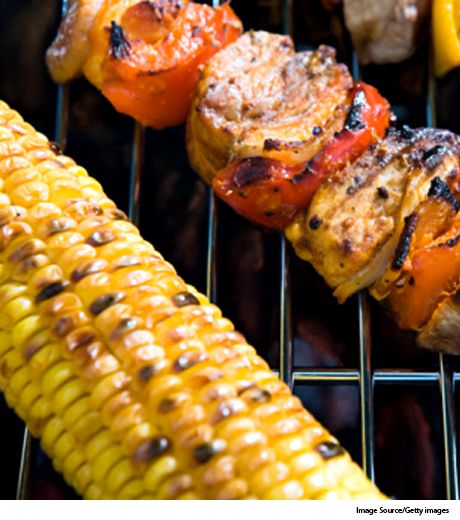4 Independence Day dangers for pets
Independence Day dangers: Picnic foods
< Back | Start >
Picnic foods

Dangers:
Some common July Fourth picnic goodies can pose serious health risks for dogs and cats.
• Corncobs: While corn is certainly not toxic to pets, the cob can easily become lodged in a dog’s esophagus or intestines, often requiring surgical removal.
• Grapes and raisins: Though these make great treats for people and are often found in healthy summer salads, even small numbers of grapes and raisins can cause sudden kidney failure in dogs and, potentially, cats. Some pet-safe picnic foods include carrots, peas, green beans, and apples.
• Meat scraps and drippings: Dogs love to hover around the grill and will ingest almost anything that falls from it. The most problematic grill foods for pets, especially dogs, are large, fatty meat scraps and large amounts of grease in grill drip pans. When dogs eat large amounts of fat and grease, they may suffer from pancreatitis (inflammation of the pancreas), which is painful and potentially life-threatening. Certain breeds, especially miniature Schnauzers, are more likely to develop pancreatitis.
Clinical signs:
• With fatty meat or corncob ingestion, delayed onset vomiting will occur one to four days later, and pets may experience abdominal pain, diarrhea (with or without blood), no stool production or straining to pass stool, and a reduced appetite. Lethargy may also be seen with pancreatitis or a bowel obstruction.
• Following the ingestion of grapes and raisins, vomiting within a few hours is typical. Within one to four days, pets may experience increased urination, increased thirst, lethargy, and a reduced appetite.
Treatment:
• Corncobs: If a dog ingests a corncob (or any potentially obstructive object), it is best for pet owners to speak to a veterinarian right away to determine the best course of action. The immediate induction of vomiting at home is not always wise. Objects such as corncobs may become lodged in the esophagus while the dog is attempting to vomit them up—a situation known as “choke.” This is a true medical emergency and must be managed in the veterinary hospital. In cases where the obstruction is in the stomach or intestines, surgical removal is often necessary.
• Grapes and raisins: Pet owners may safely induce vomiting at home in many of these cases; however, they should not do so without the directive of a veterinarian. Next, the pet should be quickly brought to the clinic. When the patient arrives, induce vomiting and then administer activated charcoal to decontaminate (adsorb and remove toxins). Follow up by administering anti-vomiting medication and aggressive intravenous fluids to protect the kidneys. Frequent monitoring of kidney laboratory values, as well as in-hospital care are also recommended.
• Meat scraps and drippings: The treatment of pancreatitis can be quite involved. Anti-nausea and anti-vomiting medications, IV fluids, monitoring of blood chemistry panels, and in-hospital care may all be needed. In certain cases, other drugs such as antibiotics and pain medications may be necessary.
Prognosis:
The prognosis for all of these problematic picnic foods is good if treatment is started early. However, for dogs that have already developed a severe bowel obstruction, kidney failure, or pancreatitis, the prognosis becomes worse and treatment much more involved.